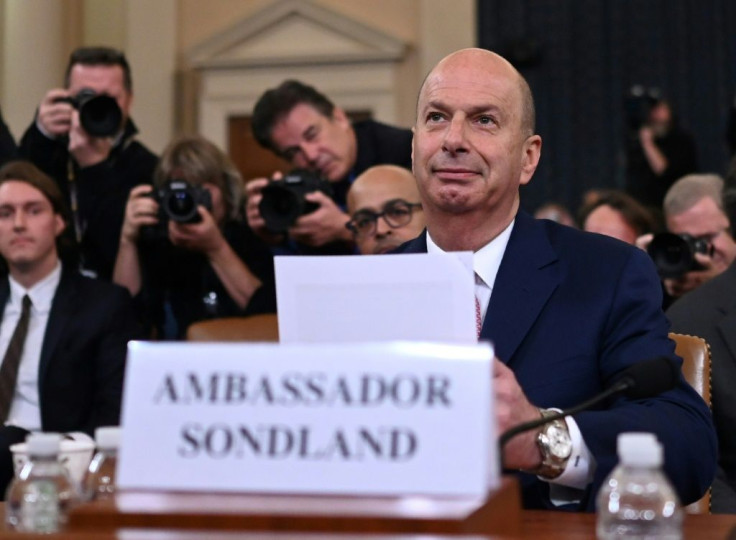Trump Impeachment Update: Witness Implicates President, Guiliani In Bombshell Testimony

Gordon Sondland, the U.S. Ambassador to the European Union, testified Wednesday any meeting between President Trump and his Ukraine counterpart and the release of nearly $400 million in military was dependent on Ukraine launching an investigate Trump’s political rivals and a debunked conspiracy theory.
Sondland denied he was involved in carrying out any rogue policy in testimony before the House impeachment inquiry, which is trying to determine whether Trump abused the power of his office by pressuring Ukraine President Volodymyr Zelensky into investigating former Vice President Joe Biden, his son, Hunter, and a discredited conspiracy theory that posited Ukraine, not Russia, was responsible for U.S. presidential election interference in 2016.
Trump characterized the hearings as a “kangaroo court.”
President Trump: "Right now you have a kangaroo court headed by Little Shifty Schiff." pic.twitter.com/BjauknsDwr
— The Hill (@thehill) November 20, 2019
In his prepared remarks, Sondland said in the fourth day of public hearings he was merely following Trump’s directives and endeavored to keep the State Department informed. He said he worked with Trump personal attorney Rudy Giuliani “because the president asked us to do so.”
"Everyone was in the loop. It was no secret," Sondland said.
He added: "Although we disagreed with the need to involve Mr. Giuliani, at the time we did not believe that his role was improper." The “we” refers to Sondland, top Ukraine envoy Kurt Volker and Energy Secretary Rick Perry who were tasked with getting Ukraine to announce the investigations.
Sondland said he was not in favor of withholding $391 million in military aid to the former Soviet Republic, which has been fighting off Russia-backed separatists in its eastern provinces.
Under questioning by committee Chairman Adam Schiff, Sondland confirmed everyone knew there was a “quid pro quo” involved if Zelensky wanted a White House meeting with or at least a call from Trump. Zelensky would have to announce an investigation into the Bidens and the conspiracy theory.
“Was there a ‘quid pro quo?’ As I testified previously, with regard to the requested White House call and White House meeting, the answer is yes,” Sondland testified, adding, “This is what we heard from Mr. Giuliani.”
Sondland confirmed he spoke with the president the day after his July 25 call with Zelensky during which he asked him to initiate the investigations. The president framed it as a “favor.”
Schiff accused Trump and Secretary of State Mike Pompeo of making a concerted effort to block the impeachment investigation, reminding them, “They do so at their own peril,” noting an obstruction count was included in the articles of impeachment prepared during the Nixon impeachment investigation.
“My lawyers and I have made multiple requests to the State Department and the White House for these materials. Yet, these materials were not provided to me. They have also refused to share these materials with this Committee,” said Sondland, who was testifying under subpoena.
“These documents are not classified and, in fairness, should have been made available. In the absence of these materials, my memory has not been perfect. And I have no doubt that a more fair, open, and orderly process of allowing me to read the State Department records would have made this process more transparent.”
© Copyright IBTimes 2024. All rights reserved.





















